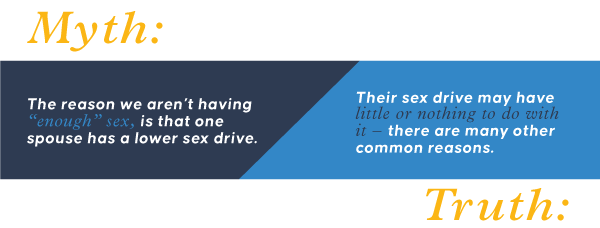
You giggled about it in middle school, read about it in books, and have seen it implied or portrayed countless times on-screen. And your mind and heart have absorbed dozens of myths about sex in the process. Some of these misconceptions are relatively harmless (stock up on those oysters!) – but some are keeping you from the delightful, playful, and intimate life you long for.
And you don’t even realize it.
After three years of research for our brand-new book, Secrets of Sex & Marriage, coauthored with renowned sex therapist Dr. Michael Sytsma, we have identified what Hollywood – and your friend in the locker room – gets most wrong about sex. And what you can do right.
These fascinating truths won’t solve big, specialized problems. But in many, many cases, they will improve your relationship, your connection, and make those specialized problems much easier to solve…together. Read on to debunk five of the damaging myths we uncovered, and begin to move toward one another to create the intimacy you’ve always wanted.

It is so easy to feel isolated in this area. Our intimate relationship is one of the only areas of life about which we rarely talk to anyone else. As one male ministry leader told me, “Because of my role, I’m in several men’s groups. We get pretty close and share a lot. But on this topic – no. A guy might get transparent enough to say, ‘We’re not having much sex’ … but that’s about it. He won’t go any deeper. That isn’t ‘talking about it.’ And because we don’t talk about it, we have no grid for what else is going on out there – other than what we see on TV, which often does not match our experience! This is one of the most important issues in marriage, and it is also the one in which we can feel the most frustrated and alone.”
Here’s the good news: You are not alone. In our research, 98% of respondents in one nationally-representative survey revealed one or more meaningful issues that impact a couple’s sex life – dissatisfaction with frequency, sexual pain, communication difficulties, different levels of desire, porn use, medical issues like ED, and many other common concerns. Nearly everyone has something. If you have a concern, you can reach out to a medical professional, pastor, or friend, knowing the professionals have heard it all before and the friend has probably navigated something in their own marriage.

One of the most common heartaches is the simple pain of wanting more intimacy than is happening. We think from watching the average rom-com that most men and women want the same amount of sex (and a lot of it)! This myth can lead to such hurt, when we feel like something is wrong with our spouse – or with us.
The truth: in our nationally-representative “matched pair” survey of married couples (spouses who were married to each other), eight in ten couples (79%) wanted different amounts of sexual connection. Just 21% of couples were on the same page. In most marriages, one person simply wants more than the other. And thankfully, as we’ll discuss more below, it is often so much easier to get to a good place than we realize.
If you’re curious about other data, like how often couples are connecting, what the average frequency is, and so on, start with page 40 of the book. Call me slightly embarrassed, but there is a lot of good information in there (averages about pleasure, practices, and so on) that is helpful but that I am not going to share in a blog post!

When my husband, Jeff, and I speak at marriage events, I frequently hear from women who pull me around a corner and ask, in a low voice, a question that starts like this: “I know we’re unusual, but in our marriage, I’m the one who wants more sex, and … ”
I always interrupt. “You’re not unusual. In 24% of marriages, the wife is the higher-desire spouse.” I gesture to all the couples wandering around the church or auditorium and say, “That means one out of every four of these couples is like you.”
One such woman stared at me in shock. “What we hear at marriage conferences is that the husband is the one chasing his wife around the bed. But in my relationship, I’m the one chasing my husband around the bed!” She said she and her husband had been burdened for ten years by feeling defective – they both thought she must be hypersexual, or he must have a deficient libido, or both. And while both conditions do exist, in most cases (like theirs) it’s simply just how the two individuals are wired. What freedom comes from realizing this! You can approach one another based on honoring your natural patterns rather than trying to fit your spouse (or yourself) in a box.

This is one of the most common, sneaky, and damaging myths. We think if we are not connecting as much as one or both of us wants, there’s usually just one reason why: One person’s libido level is simply lower than the other’s. (“My spouse just isn’t as interested. Don’t they find me desirable?” Or “I just have a lower libido; I know my spouse wants to connect more often, but there’s nothing much I can do about my sex drive.”) And since it seems like there’s nothing much we can do, we stop pursuing solutions. It is all too easy to give up, back off, stop talking about it, and settle into a pattern that neither of us is happy with.
Here’s the amazing truth: While one spouse very likely does have a lower sex drive, that often is not the main reason for the disconnect! Indeed, we were surprised and encouraged to find that most couples are not nearly as far apart as they think they are. Instead, other common factors are often at play – simple factors like:
- Having different desire types (see Chapter 4)
- Not having a mutually-understood way to initiate (Chapter 8)
- Having conflicting ideas of how things “should” work inside and outside the bedroom (Chapter 3)
- Feeling unable to talk about sex well, with one another (Chapter 2)
- Regularly hitting one another’s insecurities without intending to (Chapter 6)
- Not hearing certain things your spouse has been trying to share (Chapter 7)
… and many others. We may have never realized these factors even existed. But once our eyes are opened, we can look for what might be the “real issue,” and start working together on strategies that actually work!

We’ve absorbed this damaging myth straight from every movie where the lead characters glance at each other and get that hungry look in their eyes. Pretty soon their clothes are off and they are in bed. We subconsciously think that is just how sex works: you feel desire (you are “interested”) and you do something about it. If it doesn’t work that way, you think something is sort of … broken.
Here’s the problem: that concept of “this is just how sex works” is just one type of desire … which is present in less than half of the population! The truth is, there are two primary types of desire: “initiating desire” (the “I’m hungry for you” Hollywood type), and “receptive desire.” And more than half (55%) of the population have receptive desire! I will have to unpack this more in another blog, but the key is that the person with receptive desire tends to feel desire in the reverse order. In most cases, the receptive spouse first decides to get sexually engaged with their spouse. Only once they begin connecting well with their spouse in that way do they feel the sense of sexual desire that their partner may have felt from the beginning!
Once you realize that the two of you may have two different types of desire, you can honor what each other needs and not assume that someone isn’t working right. For example, it is game-changing for an initiating spouse to realize that their receptive partner isn’t frigid or uninterested – it’s just that their brain and body may simply need a little flirting or anticipation time in order to begin thinking about it in advance. Or that there may be an outside-the-bedroom obstacle (that argument from last night, the worry about that work meeting) that needs to be addressed first.
Can you see how these “aha moments” are so simple – and how they can help the most important relationship in your life feel more intimate and connected? If you do have more specialized issues, please seek the additional help you need – while being strengthened in your goodwill for one another and eagerness to work on them together.
Wanting to help people understand these common potential reasons and solutions is one of the main reasons we spent so much time, money, and energy researching and writing Secrets of Sex & Marriage over the last three years.
We are so excited to share these crucial findings with you, and hope that as you learn, you will share them with others.




